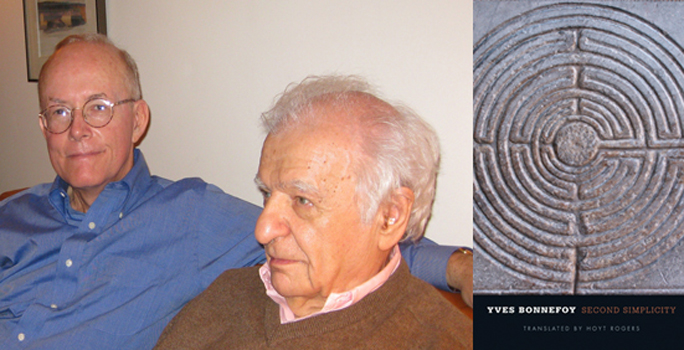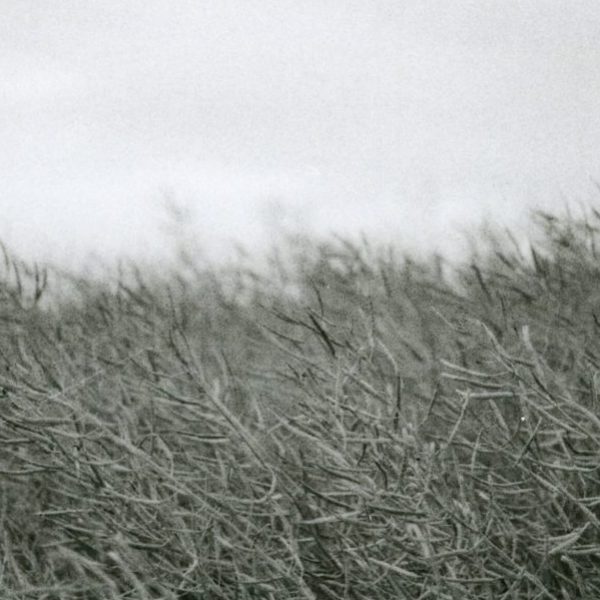Yves Bonnefoy’s New Writing on Shakespeare, Part II

Hoyt Rogers, left; Yves Bonnefoy, right
Earlier this year, the publication of Yves Bonnefoy‘s Second Simplicity: New Poetry and Prose, 1991-2011, translated from the French by Hoyt Rogers, brought the French poet’s latest writings to an audience of English readers. Included in this translation were two unpublished fantasias on Hamlet— each a succinct tour de force that vividly reminds us of Bonnefoy‘s profound closeness to Shakespeare from his own work as a translator. For the author’s birthday in June, we posted the first fantasia, “First Sketch for a Staging of Hamlet,” as well as a conversation between Bonnefoy and Rogers on translating work for their new volume on the Margellos World Republic of Letters website.
Here, we bring you the second fantasia: “Hamlet in the Mountains.” It builds on the first fantasia’s impossible stage-set: a theater as vast and diffuse as a mountainside, and explores in more depth the splintering of Shakespeare’s characters as they are refracted through the echo chamber of this unique environment.
Hamlet in the Mountains
They’d announced a performance of Hamlet in the mountains.
Up there it was strongly felt people should know what enormous masses of stone always surrounded the Prince of Denmark, in Shakespeare’s mind. Rock walls that tower above him or huddle around him, faults that fissure between them. So his voice will never reach us except from afar, almost muffled by torrents hurtling down a precipice, while birds from those other worlds screech overhead.
As for the audience, as soon as they pass the box office – a small hut at a trail-head beneath a sweeping cliff – they’ll have to move on without letup. Why is that? Because the play’s various scenes have been dispersed, regardless of sequence, over an equal number of places in the mountains? Among those who once sponsored the performance, some would have preferred that approach. There had been support for having Hamlet berate his mother at a farm on the high-range meadows. Casting long shadows on the walls, servants would carry candles to and fro through one of the rooms; in their glow, he’d drag her by the hair and throw her on the bed. Soon he’d collapse in tears, his frantic hands fumbling at her knees. And maybe, in some far-flung valley, actors exist who play like that, live like that, grow old in the gloom of inexhaustible speech, with other scenes unfolding elsewhere, ending there and beginning again. Oh no, said others; that’s not what the mountains want from Shakespeare.
 No doubt about it: spectators on crossing the theater’s narrow threshold; they press by, closely packed, so many they seem infinite. They grope forward, stumbling, almost falling down in the blackness of this night. But there, up ahead, what’s going on? “Two people are arguing,” a young man exclaims, running toward me against the current – which causes mayhem in the crowd. “One of them grabbed the other by the collar; he’s shaking him and shouting.” I want to know what it’s all about, so I wedge past backs that testily shift aside beneath umbrellas – rain is falling from the sky, and a chill as well. But I’ve gone to all this trouble in vain. The onward flow hardly admits any leeway, and the trudging, clamorous host overwhelms me. I’m shunted off on the side path, where I’m surprised to find almost no one now.
No doubt about it: spectators on crossing the theater’s narrow threshold; they press by, closely packed, so many they seem infinite. They grope forward, stumbling, almost falling down in the blackness of this night. But there, up ahead, what’s going on? “Two people are arguing,” a young man exclaims, running toward me against the current – which causes mayhem in the crowd. “One of them grabbed the other by the collar; he’s shaking him and shouting.” I want to know what it’s all about, so I wedge past backs that testily shift aside beneath umbrellas – rain is falling from the sky, and a chill as well. But I’ve gone to all this trouble in vain. The onward flow hardly admits any leeway, and the trudging, clamorous host overwhelms me. I’m shunted off on the side path, where I’m surprised to find almost no one now.
After a few steps along this trail of light-colored sand, with puddles here and there, I see two men coming in my direction. Our paths are about to cross, and they’re talking to each other. As they walk by me, I even hear one of them say, pensively: “What’s Hecuba to him, or he to Hecuba?”
Now I understand. The scenes of Hamlet aren’t strewn over the mountains: it’s the players who’re scattered through the crowd. This had broken up the scenes, unraveling the action. On the other hand, among these spectators streaming by in even-larger droves, perhaps another scene will come to a head and take shape – will cry out its meaning, even without the drama’s characters nearby – the great scene that can’t be found in the work’s unraveling text.
I grasp this thought, and I applaud this desire: all the more since the action, blown apart like that, demands the same kind of density as this tramping which has lost all origin, and which will never end. The director – omnipresent in fact – has been obliged to multiply the actors, at the very moment he’s dispersed them. That’s why he’s sent a wave of them into the surging, turbulent swell of this bewildering horde. Many play Hamlet, many play Polonius or the amazing Gertrude, just as many play Laertes or Ophelia. It follows that a huge number of men and women here aren’t what they appear; instead, they’re Hamlet, Polonius, Claudius, even Rosencrantz and Guildenstern – swarms of them. From now on, their varied features make them into real beings, more or less. With beautiful faces at times, or mad gestures here and there, they’ll wander through this dazed throng indefinitely, on the grassy terraces of their immense Elsinore. All pursue certain concepts of their personae, skillfully molded by those who portray them; though often, they can’t find the words to express their intent. All feel stunned by being who they are; all are frightened by these gigantic boulders, which either funnel them into cramped passages, or seem to draw apart, majestically – on a beyond that roars like a stream down below, rumbling forever in the abyss.
I file up a side path, a little higher than the multitude, which is trying to traverse this mountain by a thousand different tracks; here where I am, the crown has dwindled now to just a few people.
Laughingly, a fat man passes me.
And there before me, a dozen men and women have come to a halt. They stand in a circle, but what are they looking at? I slip in among them.
It’s Ophelia. She’s sitting on a rock, her umbrella beside her. Her head is bent over a sort of handbag; she’s looking for something inside it, visibly distressed. The young woman is hardly dressed, almost nude; her shabby garment of black wool is full of holes. It looks like she must’ve put it on at random, after waking up from too long a dream. You can tell she’s cold: her hands are trembling. Is she going to pull something withering and spoiled out of her bag – the fennel, the rosemary, the columbine? The poet had wanted her to proffer them, to a world that won’t listen or understand. But wait. All of a sudden she gets up, her head still bowed, clutching the bad and umbrella to her body. She plunges ahead, tottering a bit. Where is she headed? What did she say? Where should I go from here?
We’ll spend hours and hours climbing toward that summit. Sometimes, around a bend, we catch sight of it – glimmering in the moonlight, indifferent. Roads widen before us, many of us have already taken them, while others still hesitate. The wind doesn’t stop, and it won’t stop, we realize. Even life won’t stop; being here means this: that we can’t stop living. By way of proof, here’s a rider making his way through the people who’re beside me at the moment. His black horse whinnies and rears up. The actor in the saddle – assuming he’s an actor – wears armor: he must be the older Hamlet, the dead king. But why did they deck him out in this reddish scarf, on top of his coat or mail? True, the wind sails it up very handsomely; around his hoary head, it traces lovely strokes of youthful writing. The streamer is so long you could almost believe it’s endless – that it trails off into those stars we still see, God knows why, though the wind and rain lash harder than ever.
Excerpted from Second Simplicity: New Poetry and Prose, 1991-2011, by Yves Bonnefoy, translated by Hoyt Rogers. Copyright © 2011 by Yale University. All rights reserved.
Yves Bonnefoy has published nine major poetry collections, numerous studies of literature and art, and an extensive dictionary of mythology. He is a celebrated translator of Shakespeare, Yeats, Keats, and Leopardi, and his own work has been translated into scores of languages. Honored internationally by the highest literary awards, including the Kafka Prize and the European Prize for Poetry, he is often acknowledged as France’s greatest contemporary poet.
Hoyt Rogers translates literary works from the French, German, and Spanish. His translation of Bonnefoy’s The Curved Planks was published by Farrar, Straus and Giroux, and his versions of Borges were included in the Viking centenary edition. His essays, poems, and stories have appeared in a wide variety of books and periodicals. He has also published a collection of poetry and a volume of criticism.




